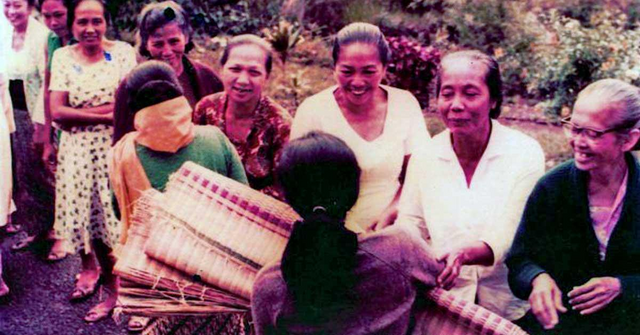Sorrow in the Feast
The voices of Takbir echoed. The political prisoners (prisoners) of Muslims in Kampungan Camp are busy preparing Zakat fitrah for the people around the camp. Although in a state of deprivation, they are still able to pay zakat. They collect it from the sale of production items during the camp.
Plantungan Camp is indeed made so that the tapol can produce their own needs. The vast land on the slopes of Dieng makes it easy to plant. This was done because the government lacked funds after the transition of power while the number of prisoners was too much due to the indiscriminate arrests.
In the morning, the tapols run Idulfitri prayers in the field near the old tree. It is said that this tree had been planted since Queen Yuliana was born, 1909. After the prayers finished, they drowned the mats and returned to their respective blocks. In front of the block, they are greeted by Christian and Catholic political prisoners who are already marching. All residents shake hands and congratulate Eid. The feast was held with camp officials and other prisoners. No family, no relatives.

In fact, Plantungan Camp provided an opportunity for families to visit relatives who were detained. But the majority chose not to use the opportunity and the political prisoners preferred not to be visited by their families.
"The prisoners prefer not to be visited because they fear that bad luck will happen to their child who has not been screened for the Suharto Government's examination," Amurwani Dwi Lestariningsih told Historia.
The trauma of the political prisoners and families about the arrest and the 1965 arrest were still strong in their minds. Some prisoner families are brave enough to visit their relatives. However, there is a play cat-kucring as did Doctor Sumiyarsih Siwirini.
Doctor Sumiyarsih is often asked by villagers around the camp to treat them. Usually, her son disguises as a villager who will seek treatment. Sumiyarsih also refrained from being caught by officers if one of the visiting guests was his biological child. Sumiyarsih worried about his relatives will be arrested if caught have a relationship with him.
Difficulty meeting with relatives often gives birth to despair. Some prisoners suffered severe depression. They pessimistic can return to live freely and gathered with family. "In Plantungan already provided the grave. My friend who died there was 12 people. When we celebrate the feast of flowers. There is no picture back home, surely dead in Plantungan. Here to die, "said Sukini, political prisoner is Purwodadi, Grobogan, as told by Amurwani in his book Gerwani: The Story of Women Prisoners in Plantungan Camp.
However, Lebaran in Wirogunan more pathetic. The day before Idul Fitri in 1967, the food that was distributed was a musty and lousy object. Female prisoners in Block F and male prisoners in Blok E agreed on a hunger strike so fasting continued all day. The kitchen management finally succumbed to grontol aka corn on the cob that was grated coconut at 9 pm.
"Wonder why those guys like to do that kind of thing. Last year his quota of gathot was poisonous, "Mia Bustam said in her memoir, From Camp to Camp.
A day before Lebaran 1966, the dinner ration from Wirogunan is not grontol but gathot, black cassava which is grated coconut. However, all that can be eaten is just grater kelapanya because gathotnya already musty.
"Women prisoners do not eat the gathot, in fact many are crying, nengahsa. Eid Want to eat food like this, "said Sumiati to Josepha Sukartiningsih who wrote" When Women Become Tapol ".
Meanwhile, male prisoners in Wirogunan directly eat gathot apek it. After a while, there was a voice of vomit. The Gathot is out of date and poisonous.
On Idul Fitri, female prisoners can pray Idulfitri with male prisoners in the prison yard. The opportunity they often use to find a figure that they long for. There was a small encounter between the political prisoners with their husbands and children who were also detained. But they can not reprimand each other and talk; there was only a look, a nod, and a slight smile from a distance as a greeting.
After the prayers, the prisoners were allowed to receive relatives' visits. But the opportunity is very small. Queue in Wirogunan crowded because both family political prisoners and detainees scramble to visit. It makes many political prisoners fail to meet their families.
Mia experienced it. She could only see her relatives in line, then waved from inside the cell. "When they reached the door of the suitcase, the time was gone. I can only accept the submissions, "said Mia. Lebaran does not merely bring happiness. There are times when Eid ultimately cultivates pain when it is impossible to gather with relatives.